Bún bò Huế is a hidden Vietnamese gem that has yet to “make it” in mainstream American cuisine. It’s a rich and spicy soup with deep layers of flavor. This Central Vietnamese soup is paired with tender slices of beef and pork, then topped with lots of fresh herbs.
I consulted my favorite Vietnamese cook–Mom–on how to make bún bò Huế. And to find out subleties that make BBH authentic. I promise you’ll love this version!
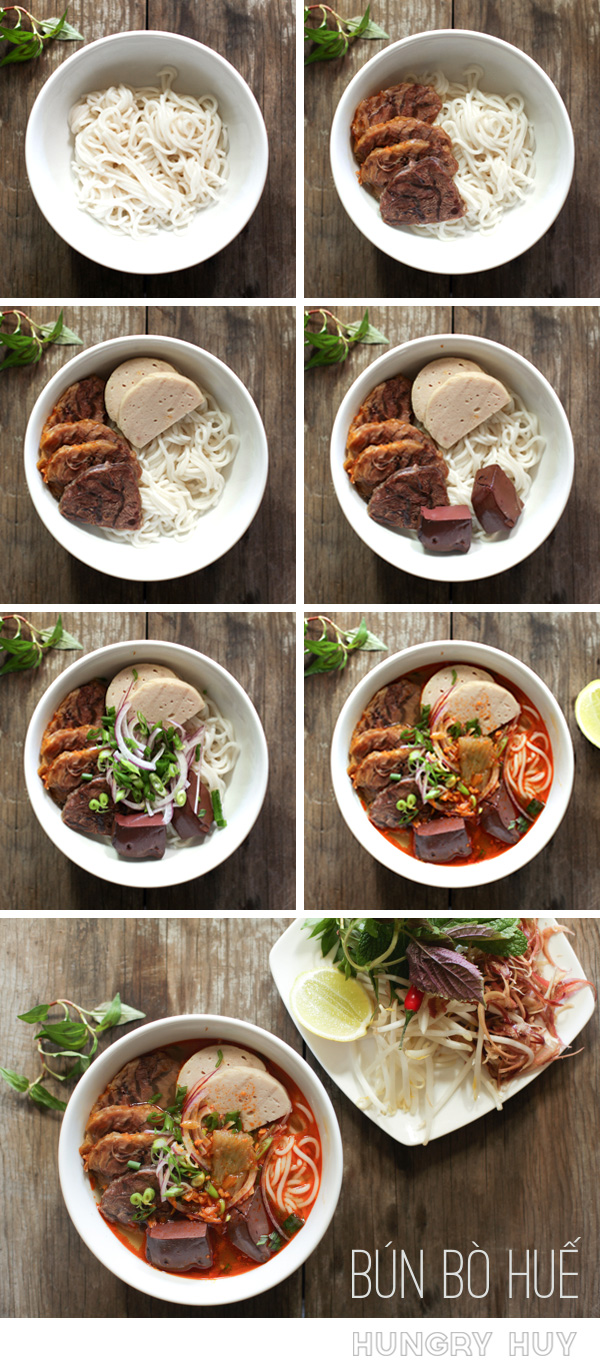
Not as popular as phở….yet?
Phở has claimed some serious territory here and has grown popular quickly. According to data from Google, since 2004 compared to March 2021, phở has grown in popularity by 830%, which is an amazing gain.
Comparatively, for the previous 12 months starting March 2021, bún bò Huế is much less popular at a measly 1.2% of the searches for phở. But why isn’t phở’s equally spicy and attractive cousin allowed to join the party?
It has a lot of familiar and identifiable ingredients–a good step in getting people to eat something new. BBH has a few curveballs that could be holding it back from quicker adoption: shrimp paste and pork blood.
America seems to not be ready for this as a mainstay yet, whereas pho’s concept is easily recognizable and pitched as beef or chicken noodle soup. BUT bún bò Huế is not something you should look over–definitely give it a shot and you may love it even more than phở!
Bún bò Huế history
The city of Huế was put on the map as Vietnam’s capital in 1802 when the Nguyen Dynasty seized control of the country and ruled from this central city.
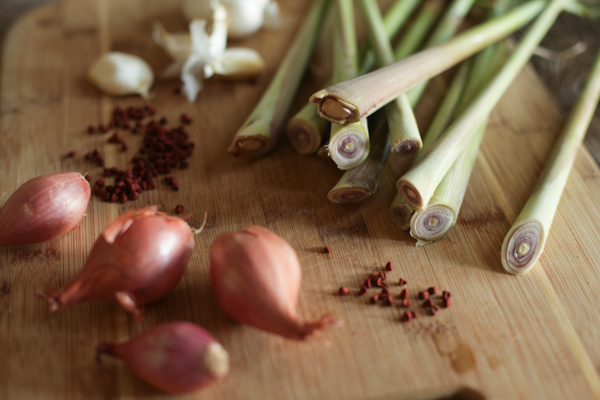
This city has a reputation for having spicy foods–not something as common with other Vietnamese cuisine. My mom believes there’s no real reason for it other than trying to boost flavor when there weren’t other options. Sounds kinda like what you hot sauce fiends out there do yeah?
Huế also just happens to be the origin of many of my favorite dishes. This city is responsible for bánh nậm, bánh bột lọc, cơm hến (omg), and of course bún bò Huế. Lez get cookin!
There will be blood (congealed and cubed)
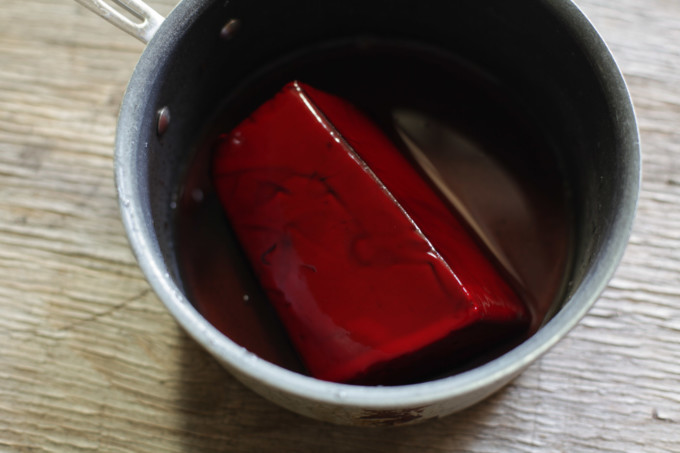
An authentic component of BBH is cubes of congealed pork blood. You coagulate it by sitting fresh blood in a container, then boiling with salt to solidify it. It’s kinda dense, slightly chewy and holds its shape when bitten.
On a recent episode of Parts Unknown, Anthony Bourdain dishes on what he needs in a romantic partner: “I would definitely bring a date for [bun bo hue]. Because if she doesn’t like this, there’s no hope of a relationship. If she said, ‘Oh, I don’t know, there’s blood and stuff in there,’ that would be a relationship-ender to me. I’m not kidding.”
If making BBH just for myself, I’d forfeit my chances with Bourdain and skip the pork blood. Shh!
The banana flowers
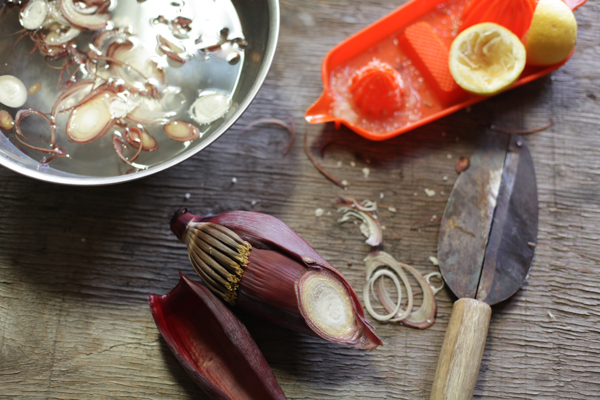
Another interesting & traditional ingredient in this soup is sliced banana flower (or banana blossoms).
You can find these in Vietnamese, Chinese, Thai and other Asian markets. I even found this at a local Persian market! This is a neat addition to this dish but is by no means required. If you can’t find banana flower, move on. You can still make some amazing BBH without it.
Prepare your bowl of lemon water, then remove all the petals. Discard all the little fronds (the mini banana-like fellas). The lemon keeps the petals from browning and removes some of its bitter taste.
Unless it’s a Huế-specific restaurant, shops don’t bother serving this because it’s pricey and troublesome to prepare. If you don’t have access to these blossoms, you can do as the restaurants do and use red cabbage as a stand-in.
The saté / spicy chile condiment
BBH is a spicy soup, so surprise there’s a chile condiment / paste that goes with this pot of soup! And it’s incredibly easy to make, it just has a lot of ingredients.
You literally just rehydrate the dried chiles, mince the fresh aromatics, then throw everything into a pan on medium and stir until it thickens up and intensifies.
It takes a long time but it’s worth it! You can make more than the amount I list in the recipe card below, to store in the fridge for future BBH parties or to give away.
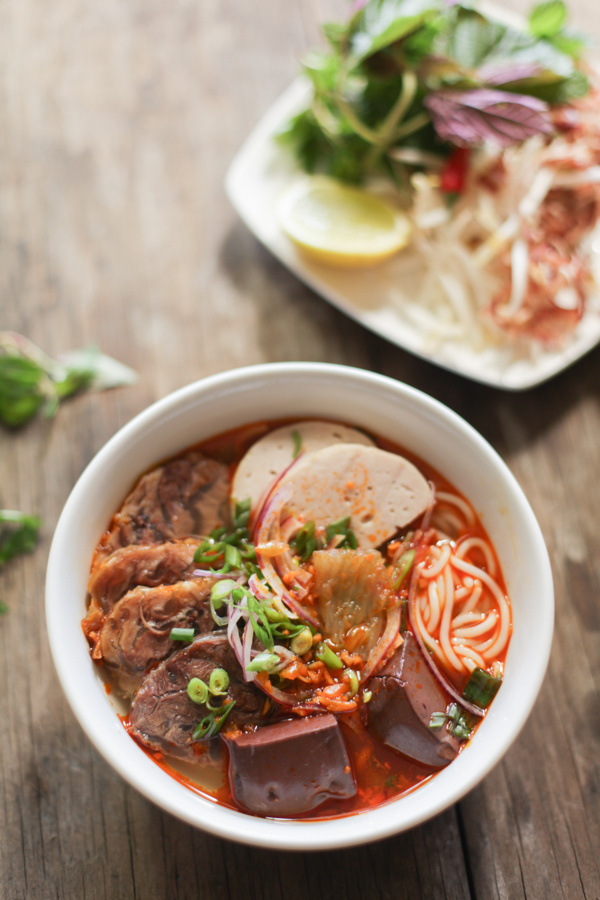
To answer some commonly asked questions…
Whats the difference between bún bò Huế and phở?
So many things! Lets start with the noodles: phở is actually named after the flat noodles in this soup, while bún bò Huế uses round noodles.
The broth in phở is typically all beef, or all chicken, and served with cuts of meat from the same animal, while bún bò Huế typically uses both beef and pork in the same broth. Bún bò Huế broth packs more of a punch with the use of shrimp paste, pork bones, and chile paste.
Phở is not lacking in flavor by any means, as it can be incredibly rich and satisfying in its own way.
Is bún bò Huế Spicy?
Yes, traditionally, and typically. However, the bún bò Huế broth base we make below, I like to make it not spicy at all. In my family and friend groups there’s always a spectrum of spicyness people can handle.
If you leave the broth at 0 spice, and leave the spicy chile paste on the side, each person can make it as spicy as they like.
Does bún bò Huế have pork?
Yes. It’s kinda funny “bún bò Huế” means Huế beef noodle soup, but it can have just as much or even more pork than it does beef.
In our recipe below, we use pork hocks, Huế style pork sausage, and congealed pork blood. Vegetarians beware.
What does bún bò Huế mean?
“Bún bò Huế” literally translates to Huế beef noodle soup.
Where does bún bò Huế come from?
Huế is a city in central Vietnam from where this noodle soup originates.
How do you eat bún bò Huế?
With chopsticks and soup spoon! But really, prepare a bowl with the soup and broth, add as little or as much meat as you’d like, then top it off with the veggies listed below: mint, Thai basil, bean sprouts, and banana flower.
The veggies make it a smidge healthier, and helps cool down the soup too.
The final touch will be how much spicy chile paste you add to the soup, and a spritz of lime if you prefer.
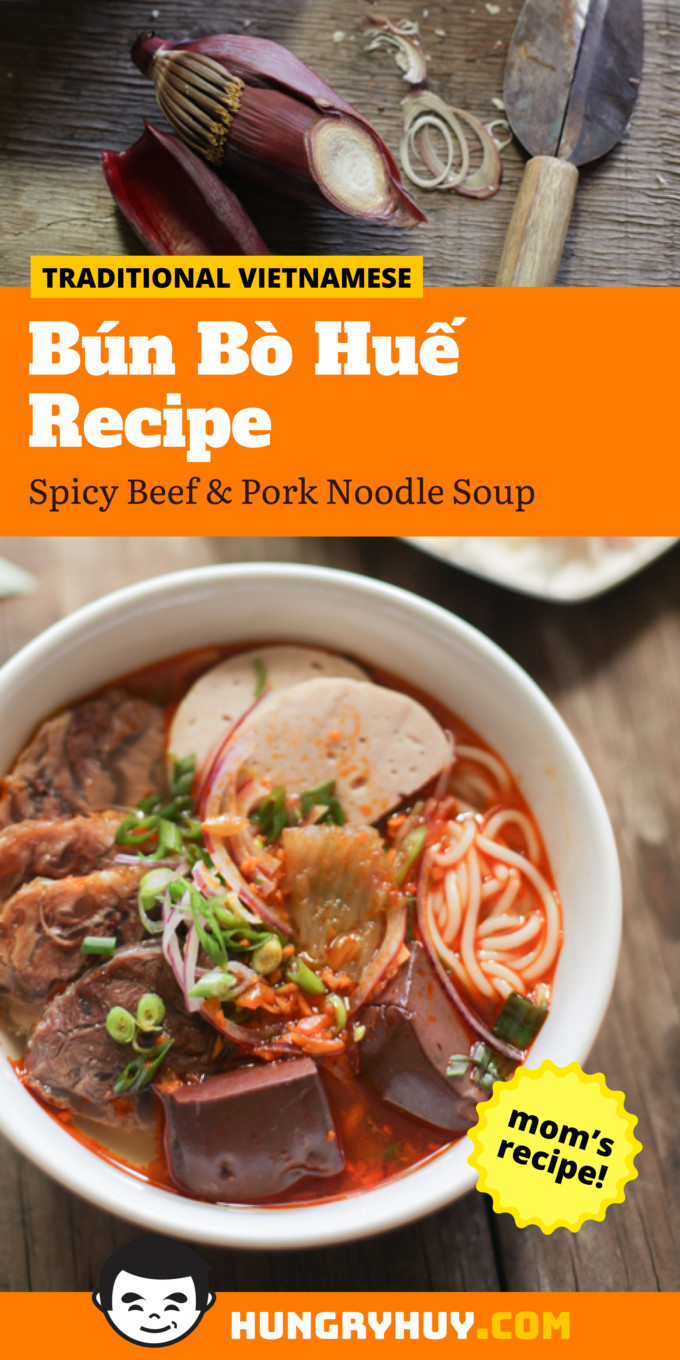
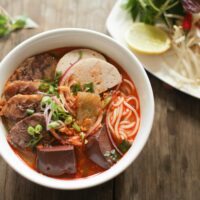
Bún Bò Huế – Spicy Vietnamese Beef & Pork Noodle Soup
Ingredients
- 2 lb (907.2 g) beef shank
- 2 lb (907.2 g) oxtail
- 2 lb (907.2 g) pork hocks
- 1 lb (453.6 g) Huế style pork sausage chả Huế, which has garlic and whole peppercorns
- 1 lb (453.6 g) block of pork blood
Broth base & Seasoning
- water I used an 8 quart pot, and added water to cover the meat.
- 24 oz chicken broth
- 12 stalks lemongrass leafy tops removed, roots smashed
- 2 yellow onions, large halved, to be removed from the broth after fully cooked.
- 3 tbsp salt
- 2 tbsp sugar
- 2 tbsp shrimp paste Lee Kum Kee brand
- 3-4 tbsp fish sauce
- 2 tsp MSG (monosodium glutamate) if not using oxtail, add 4 teaspoons
Aromatics & Color
- 3 tbsp anatto seeds
- 3 tbsp neutral cooking oil
- 2 tbsp shallot sliced
- 2 tbsp garlic minced
Herbs & Veg
- mint
- basil
- bean sprouts
- birds eye chile or jalapeno
- lime sliced
Banana Flower
- 1 banana flower
- 2 cups water
- 1 lemon juiced
Noodles
- 14 oz (396.9 g) package dried rice noodle medium or large thickness
Saté (spicy chile condiment)
- 20 g dried Thai chile crushed
- 1/2 c neutral cooking oil
- 80 g shallot or white onion minced
- 40 g garlic minced
- 30 g lemongrass minced
- 2 tbsp Korean chile powder (gochugaru)
- 1 tbsp fish sauce
- 1 tbsp sugar
- 2/3 tsp salt
- 1/2 tsp MSG (monosodium glutamate)
Instructions
Broth
- Clean the meat: Add all meat to a stock pot and enough water to submerge it, bring to a boil. Drain and rinse thoroughly under running water.
- Add the meat, broth, lemongrass and onions to the pot and fill with water almost to the brim. Bring to a boil then drop the heat to medium-high to maintain a low boil. Add the seasoning.
- Let it simmer and periodically check the meats for doneness and remove them as they finish cooking. The pork should be done after about an hour, the beef can vary between 2-3 hours.
- After all the meat has removed, let it cool, then slice it. Adjust seasoning and add water to the broth pot if necessary.
- Make the aromatics & coloring then add it to the pot.
- Boil noodles according to package instructions.
- Assemble your bowl, and serve with herbs and veg on a side platter.
Red Coloring & Aromatics
- Sauté seeds in oil on medium heat until the seeds give up the bright red color, then remove the seeds.
- Add shallots and garlic, sauté until brown.
- Add all of this to the pot of broth for color.
Pork Blood (Huyet / Tiet)
- The easiest thing to do is just buy it already cooked and boil just to heat it up. If you use the raw type like we did for this recipe, cut into 1″ cubes and boil for 30-45 minutes
Banana Flower
- Prepare a bowl of about 2 cups of water, mixed with the juice of 1 lemon.
- Thinly slice the banana flower and add to the water mixture to sit for about 30 minutes.
- Avoid adding little fronds (that look like mini bananas), removing them as you encounter them. They taste bitter!
Saté (spicy chile condiment)
- Weigh out the dried Thai chiles, then soak in just enough warm water to cover the chiles for 20 minutes. Drain the water.
- Add all sate ingredients to a pan on medium heat and stir continuously to brown, cook, and slightly reduce the chile paste, about 30-40 minutes. If at any point it becomes too dry, you can add more oil, up to 50% of the amount we started with. Taste and reseason with sugar or salt as desired. See photo for how the final product should look.
- Let cool and transfer to a sealed jar stored in the fridge . You can add ~2 tbsp of the final product to the soup pot for a boost in flavor and color, or simply and let each person add to their bowl to make it as spicy as they'd like!

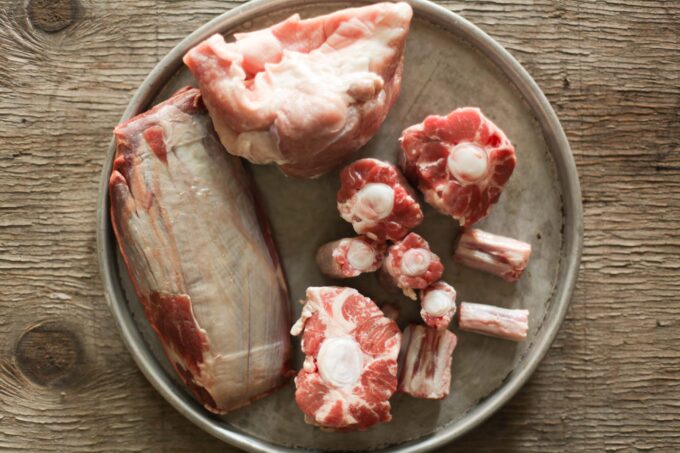
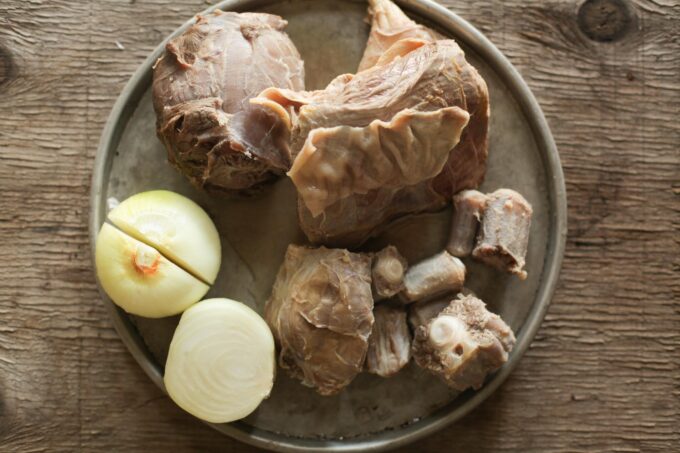
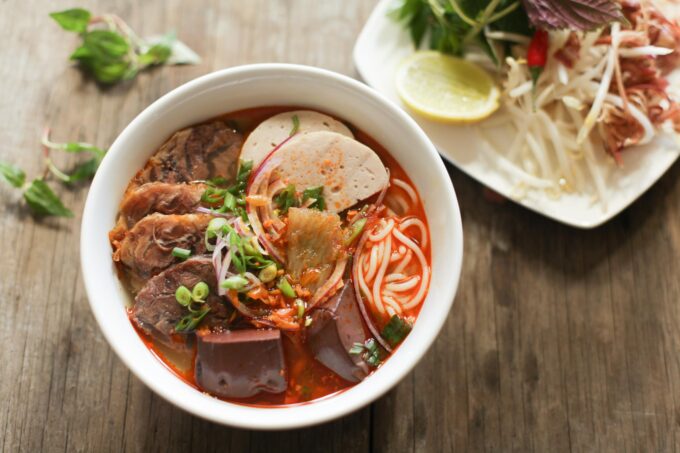
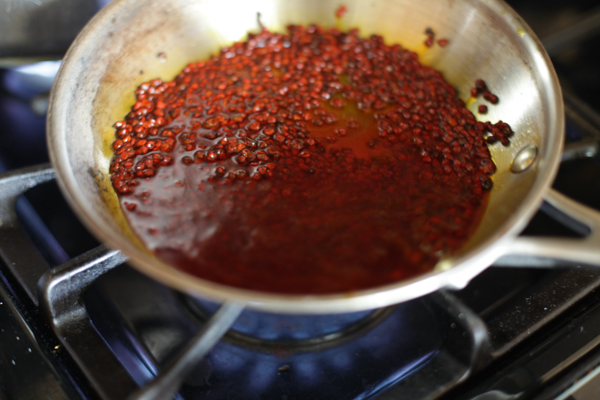


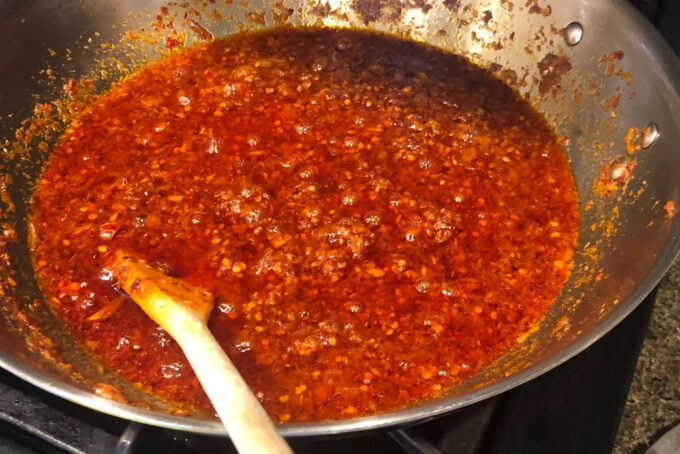









I could use a bowl of this right now (minus the blood, of course)! LOL! Weirdly enough, I hated eating bun bo Hue when I was a kid. It wasn’t until I was into my 40s that I tried it again and love it. It could be because my mom didn’t make it right (bland) or my tastebuds weren’t quite developed back then. But I have friends who made this and I eventually waded my tastebuds back into testing this soup out again and now think it’s better than pho. Not saying much as I never understood the passion over pho as it is not even the most delicious Vietnamese food or meal. It’s good, but yeah, there are plenty of other Vietnamese food that is WAY better.
I hope to see you make the blood sausage and put it in chao. I’m not a fan of blood in general, but love it in porridge (although most people I know only use blood chunks, I remember eating it with the broken up pieces of blood sausage…yummy with all the aromatics and herbs. Thanks for taking the time to show us this great recipe, Huy.
Hang, good to hear from you! I don’t know about completely dismissing pho here, but BBH is great.This is something I’ve noticed about myself too–a change in taste preferences over time but ever so slowly. I’m glad your tastebuds waded back, or else you’d be missing out!
As for the chao, yup. I’m used to having it with a regular pepper-spiced sausage yes! But blood… We”ll have to see about that one. 🙂
my american husband loves the blood, but it has to be really good. we’ve been to dive places where the blood in the bbh isn’t great, which ruins the bowl. personally, i don’t like it, and confession: i didn’t like bbh growing up. if it was what was for dinner, i would make myself a sandwich while the rest of the family ate it. i have since grown to like it somewhat, but i do have a preference for pho…
Haha thanks for sharing Lan! I feel ya, sneaking off to make a sandwich (or picking up fast food) was most of childhood, sadly. Yep agreed that having one off ingredient for a recipe can sometimes throw the whole dish. Props to your hubs though 🙂
BBH doesn’t get enough of a chance though since people just don’t know about it. I’m glad you’ll eat it now though!
I just discovered your website. Your recipes are so great! I look forward to more recipes in the future 🙂
Thanks a lot Daisy–yep lots more recipes on the way!
Yum! I love bun bo hue, especially when you eat it with bap chuoi and rau muong bao 🙂
This recipe is so straight-forward and easy to follow. Thanks a bunch !
Just a bit on the side, but are you interested in becoming our recipe partner?
I love BBH except for 2 things: the blood (!) and I have so much trouble picking up the noodles with those slick plastic chopsticks. Give me the cheap bamboo chopsticks every time! By the way, have you tried Menudo? It is kinda like BBH Mexican style, complete with stuff to add in, but lacking noodles, of course.
Yeah those plastic chopsticks are quite slippery, and yeah the bamboo ones are are quite grippy. A nice pair of wood ones are good to keep around.
I’ve always grown up nearby Vietnamese and Mexican neighborhoods but still have not given menudo a shot. To hear its like BBH is a good sign though, I’ll have to try it sometime. I can’t help but picture Ricky Martin though. Thank you for sharing Janet!
I would say Pozole might be considered more like BBH, and Menudo more like Pho…
I’m making your Bun Bo Hue today! Tried your Pho recipe a few months ago for some of my Vietnamese friends. One comment was, “wow, just like Mom’s”!! So, I’m hoping for the same result. Love your recipes. Very easy to understand and the pictures are helpful! Thanks!
Oops, I meant your Bun Thit Nuong recipe…not Pho. Lol.
Hi Huy,
Did you get a chance to post your recipe for the spicy chili to go with bbh? Would love to have it!
Thanks,
Is there a substitution for MSG?
My aunt cooks a lot of vegetarian food and uses mushroom powder instead of MSG. Seems like this is becoming more popular in Vietnamese markets in the last few years.
Just came across your recipe and so glad I did. The instructions are not overly complicated for rookies like myself and it turned out great. Thank you for sharing Huy and I will be sure to check out your other recipes!
Heyo Tracy! Glad it turned out well, let me know if you have any questions about the other recipes 🙂
Hi Huy,
Thank you for sharing your recipe for Bun Bo Hue, are you able to show us how to prepare your noodles to be so soft, as I think the noodles is one of the most important aspect of the dish?
Thanks.
Hey Hieu! The noodles should just be made according to the packaging. The longer you boil the softer it gets, and it will keep cooking a bit after you remove it from the water as long as its hot.
In Vietnam, we added some shrimp paste – mắm ruốc, to the broth. Some people like to add more in there bowl. ?. While writing this, my bbh pot is simmering. The aroma of beef and lemongrass is in the air ?
Thanks for the tip Nha!
Ahhh, so you’re supposed to remove the anatto seeds after sauteing… My mother left that part out so my BBH has always had red flakes you kind of had to spit out or try to ignore…
I can’t seem to find the spicy chile paste recipe you mentioned in the bun bo hue post . Can you share it please ?
We tried your recipe today and it was excellent! One thing that my girlfriend added was pineapple! I actually called my mom who is Huy and she mentioned that they add pineapple for sweetness and to also tenderize the meat.
I’m confused, what am I suppose to do with the banana flower after I prep it? And what do I take out to make it not so spicy?
Sorry if that wasn’t clear! This is meant to be added to your bowl of soup just before eating it. To have this soup less spicy, you can omit the chiles.
What’s the Banana Floor? What do I do with it?
Hey Huy,
Thanks for sharing this recipe. Looks delicious and can not wait to try it. I have just one question. Do you throw in the pork sausage along with all of the meats into the pot as well or is this supposed to go in the bowl once it’s complete?
Only add once it is complete!
Bun bo hue is truly special and you have a great recipe. I do agree with Nha Le… add shrimp paste to the broth and it makes it so much better (Boil the shrimp paste with a small pot of water and only pour in the clear broth). Also adding daikon and pineapple really sweeten the broth. 🙂
This recipe looks great! How far in advanced can you make the broth? I’m planning on making this for a potluck and wanted to what’s ideal? 2 days?
Do you have any recipes in Vietnamese? I am teaching a health class and need to find recipes IN Vietnamese that are culturally preferred by my students. Any help would be appreciated!
Thank you.
If I wrote recipes in Vietnamese it would ensure many disaster stories :), nope sorry!
Hi, anh Huy! I just want to let you that my 10-years old son approved your recipe, “It’s perfect! Don’t need to add anything!” I tried to cook BBH 2 times using someone’s recipe and I was not happy/satisfied, which leads to low confidence. I didn’t think it was the recipe; however, I thought maybe I didn’t follow the recipe correctly. My son starts to love eating BBH (every single day if he can) after 8 years of convincing him that BBH is better than Phở. I have decided to cook BBH once more; however, I would like to try your recipe instead. It is awesome! I like it and most important, my son loves it! Thank you very much for the recipe and assembling steps.
Getting something a picky kid likes right seems like a huge achievement–awesome! It is a nice changeup from pho–thanks for sharing Christina 🙂
So friggin good! Since my husband and I are inside most of the day, we took advantage of the time to cook something we’ve been craving for awhile.
This recipe was incredibly easy to follow and the result was amazing. Would highly recommend if you have the time.
Thanks you so much for sharing!!
Thank YOU for sharing with us, and I’m glad you enjoyed it Monika!
Can’t wait to try this recipe!
One question, do you have a recipe for the spicy chili paste? Thank you
Great recipe! As good as you can get at restaurants here (Hawaii) I left out the pork blood, msg, Annato, used store bought chili garlic oil & cut down on the shrimp paste because my family can’t handle the smell Lol! & it was still excellent! Thank you!